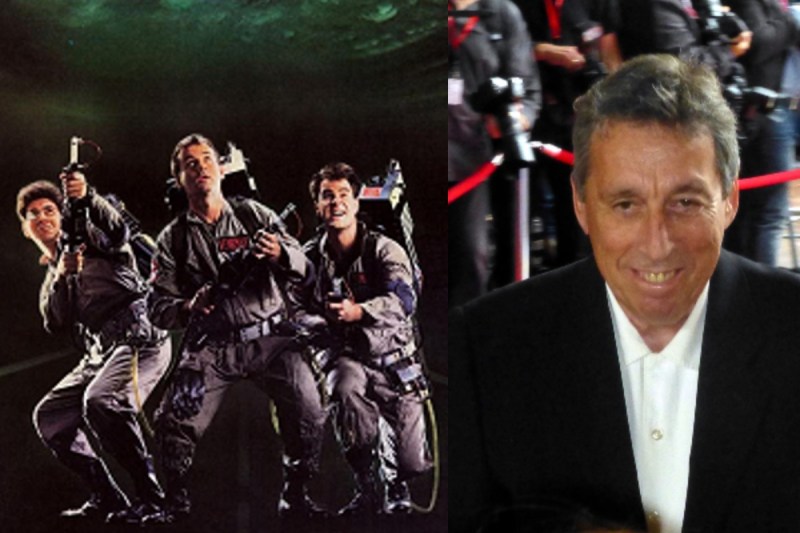Remember the glorious run of comedies that came out in the early 1980s? Oh right — if you’re under 50, you probably weren’t yet alive or at least aware of the world yet. Let’s try this: Ever heard of Ghostbusters? This serious spoof about four bumbling scientists turned action heroes earned its cast and its director, Ivan Reitman, a pop culture status that few films ever achieve. This past February 12, Reitman died peacefully in his sleep at his home in Montecito, California. The veteran director and producer was 75.
“Our family is grieving the unexpected loss of a husband, father, and grandfather who taught us to always seek the magic in life,” children Jason Reitman, Catherine Reitman, and Caroline Reitman said in a joint statement. “We take comfort that his work as a filmmaker brought laughter and happiness to countless others around the world. While we mourn privately, we hope those who knew him through his films will remember him always.”

Known for raunchy comedic romps that captured the era’s spirit, Reitman’s big break came in 1978 when he produced the raucous college fraternity film National Lampoon’s Animal House, which starred John Belushi as the hard-partying John ‘Bluto’ Blutarsky. Reitman then hooked up with Bill Murray, directing the soon-to-be hit actor in his first starring role, the 1979 summer camp sendup Meatballs. The two connected again in 1981’s lesser-known (and underappreciated) comedy Stripes, which would lead to the uber-hit Ghostbusters in 1984.
The movie grossed an enormous amount of money, with a lot of the credit going to Reitman’s uncanny ability to balance upon several directorial tightropes. The brainchild of star ghostbuster Dan Aykroyd and Harold Ramis, the pair needed someone to meld two distinct visions into something coherent. Ramis saw more humor in the story of the failed supernatural researchers turned superheroes, while Aykroyd approached the film as a true believer, wanting to deliver something darker and more serious. Reitman was there to bridge the gap.
The director also had plenty of previous experience harnessing Murray’s nonchalant approach to adhering to script, enabling him to ensure the rest of the cast delivered. Ernie Hudson wrapped the quartet’s chemistry as the cool, laid back Winston Zeddemore, Annie Potts as the no-nonsense administrative assistant Janin Melnitz, Sigourney Weaver as the fated heroine Dana Barrett, Rick Moranis as the bumbling Magoo, Louis Tully, and William Atherton as a pitch perfect heel as Walter Peck. A simple story that might have never become much in another’s hands was molded into an ageless art piece at Reitman’s lead. Engaging, aided by a killer soundtrack, the film featured laughs and action enough for kids and for grown-ups.
Related Guides
These films were just two in a string of hits that established Reitman alongside titanic era directors Richard Donner, Ridley Scott, George Lucas, and the illustrious Steven Spielberg.
After this string of hits, Reitman achieved iconic if not as memorable success with the Austrian Oak, Arnold Schwarzenegger, in the 1990s. Whilst the Terminator always had a knack for wry one-liners in his action films, Reitman elevated Schwarzenegger to an outright comic actor in Twins (with Danny DeVito) and Kindergarten Cop.
Throughout the end of the century and its first decade, Reitman stood behind the camera for fewer films but increased his role as a producer and executive producer through his company, Northern Lights Entertainment. Reitman actually began as a producer, working with horror director David Cronenberg in the late 1970s as well as on the animated classic Heavy Metal in 1981. He turned back to these beginnings with Beethoven and Beethoven’s 2nd in 1992 and 1993, Space Jam in 1996, Howard Stern’s Private Parts in 1997, Road Trip in 2000, Old School in 2003, EuroTrip in 2004, and Trailer Park Boys: The Movie in 2006.
Reitman enjoyed a career that helped to define comedy for two generations and his films will remain in the American lexicon for the foreseeable future. Not a bad life for a Czechoslovak-born ethnic Hungarian WWII refugee.



